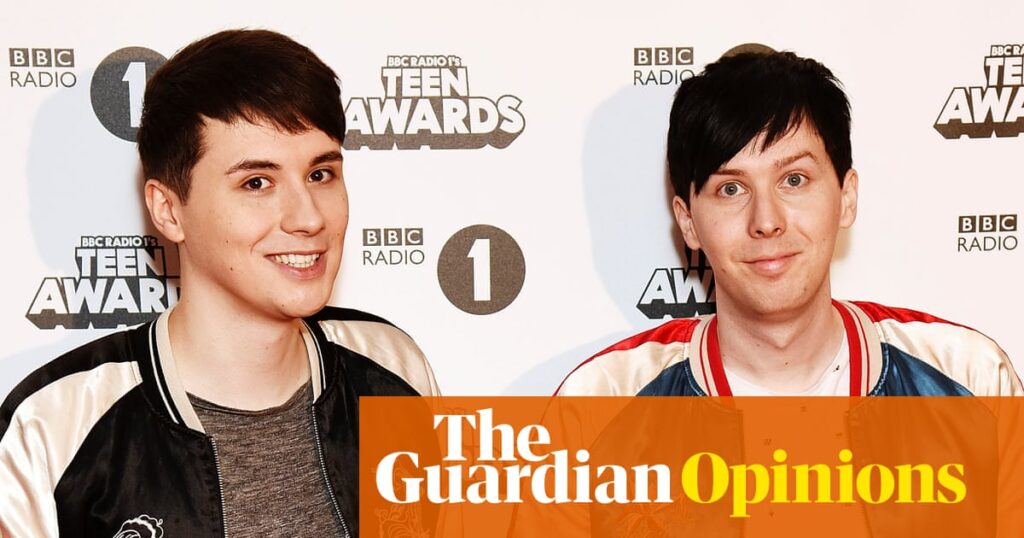This week, longtime British YouTubers Dan Howell and Phil Lester uploaded a new video confirming they have been in a secret romantic relationship for the past 16 years.
If you weren’t a deeply online child during the 2010s, you probably have no idea who Dan and Phil are, or why this matters. But to those who formed a robust parasocial bond with the duo – who have more than 13 million collective subscribers on YouTube – this was a revelatory moment. It was also a sobering reminder of the emotional damage that toxic fandoms can wreak on their subjects.
Over the course of 45 minutes, Howell and Lester, now in their thirties, share the “apocalyptic constant stress of the Dan and Phil dating conspiracy”, where “fans” subjected them to frenzied speculation for 16 years straight. Whole subsets of the Dan and Phil fandom were dedicated to “proving”, once and for all, that the pair – known as “Phan”, à la Brangelina – were more than just friends. Online sleuths went on to dox, harass, and borderline stalk Howell and Lester; in the video, they describe even being filmed at the supermarket.
As Lester describes, being a fan of Dan and Phil was as much about their funny videos as it was about “the secret mirror world of content” fans became obsessed with: the supposed hints and clues they dropped that would out a relationship they didn’t want to make public.
Howell describes the impact of his “extremely homophobic childhood”, which kept him “deep in the closet” for many years (Howell and Lester individually came out as gay in 2019).
“In my mid-20s, I felt we had to hide the relationship because I was still hiding who I was to my friends, family, myself,” Howell says. “This is why all of the digging from people online hit a nerve, because Phil was my safe space. […] what we had was the most important thing to me and I wanted to protect it, so when other people tried to grab it and drag it into the light, I felt completely violated.”
The duo relate the unique humiliation of having a private Valentine’s Day video, made by Lester for Howell in the early, heady days of their relationship, get leaked due to a YouTube glitch. Only a handful of fans saw it, but the damage was done. The video was reuploaded, shared, commented on, used as evidence in the quest to uncover the conspiracy. It nearly broke Howell and Lester’s relationship for good.
“I remember messaging someone saying, ‘Please, can you take this down?’” Lester says. “And they said, ‘No, what’s on the internet is for ever. It’s your fault.’ And I was like, ‘How can someone be so mean about something so personal?’”
Howell, clearly still shaken by the experience more than a decade later, adds: “It felt like an assault.”
Howell and Lester remain remarkably good-humoured in the video, and praise their fan community on the whole: “I want to be clear,” Howell says emphatically. “We love our audience. Dan and Phil followers are the funniest fandom. So creative. They’re good people.”
But the more distressing revelations are startling, and an apt summation of the toxic way some modern fandoms function. The term “stan” originates from Eminem’s titular 2000 song about a fan so disturbed by his obsession with the artist that he ends up committing murder suicide – and these days, in online spaces, it feels as though the ‘stan’ and the ‘hater’ are becoming one and the same. Just days ago, Billie Eilish was physically dragged into the crowd by someone in the front row of her concert. In late 2019, K-pop idol Goo Hara took her own life after being subject to severe online harassment. And just in August, Amazon shared a PSA to fans of its hit show The Summer I Turned Pretty, instructing them that there was a “zero tolerance policy for bullying and hate speech”.
“Keep the conversation kind,” Amazon posted later. “The show isn’t real but the people playing the characters are.” The caption accompanied a video graphic that read: “The summer we started acting normal online.”
In 2025, almost every public figure has a ‘snark’ subreddit devoted to them, whose participants track their every move obsessively; imagine keeping a running tally of how many times someone yawns. Haters, just like fans, are the first to click on a new video, a new song, a new Instagram upload. The parasocialism of the stan and the hater is one and the same.
And when it comes to scrutiny over someone’s sexuality, we know how invasive it can be for the subjects – because they’ve told us. In the Dan & Phil video, Howell describes experiencing suicidal thoughts directly related to the intense speculation over his relationship from so-called fans. Last year pop star Shawn Mendes spoke publicly against the widespread rumours about his sexuality, saying it “always felt like such an intrusion on something very personal to me”. This week, Stranger Things star Noah Schnapp recalled journalists asking if he was gay when he was just 12 and 13. “I was obviously very scared of talking about it,” he said in an interview with Time. “I didn’t know what to say.” A subsection of Taylor Swift fans known as Gaylors pick over her songs and interviews for evidence she is secretly a lesbian.
As Howell and Lester acknowledge, it’s normal to wonder about the private lives of celebrities – but the relentless scrutiny they have endured goes far beyond innocent curiosity. Regardless of whether it was coming from stans or haters, the “apocalyptic, constant stress” of it would feel exactly the same.

